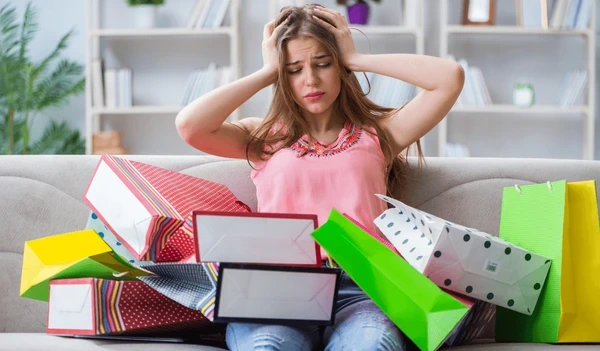
<< INDEX OF MINI-TESTS
Compulsive shopping, often classified as a behavioral addiction, can be understood through a psychological lens as a means of coping with underlying emotional distress or unmet needs. Individuals may engage in this behavior to fill an internal void, seeking temporary relief from anxiety, depression, or low self-esteem through the act of purchasing. Spiritually, compulsive shopping can reflect a disconnection from one’s true self and values, leading individuals to seek fulfillment in material possessions rather than inner peace or contentment. This pursuit of external validation through consumerism can create a cycle of temporary satisfaction followed by guilt and shame, further entrenching the compulsive behavior. Ultimately, addressing compulsive shopping requires both psychological intervention to understand the root causes and spiritual exploration to reconnect with one’s authentic self. Do you think you might be a compulsive shopper?
Examine the following statements and check the ones that best fit your perspective.
Count the number of boxes selected and examine the resulting profile.
0: You are by no means a compulsive shopper
1-2: You exhibit mild symptoms of compulsive shopping
3-4: You show major symptoms of compulsive shopping
5-6: You are almost certainly a compulsive shopper
Explanation of sentences
My self-worth is often tied to the brands and items I own
This statement reflects the psychological aspect of compulsive shopping where individuals equate their identity and self-esteem with material possessions. Research indicates that people who struggle with compulsive buying often have low self-esteem and may use shopping as a means to enhance their self-image. This dependence on external validation through material goods can lead to a cycle of purchasing that does not fulfill deeper emotional needs.
I frequently buy items that I know I will never use or wear
This behavior highlights impulsivity and lack of foresight, common traits among compulsive shoppers. Individuals may experience an overwhelming urge to buy items without considering their utility, leading to clutter and financial strain. Studies show that this pattern can be linked to emotional regulation; individuals may shop as a way to cope with negative emotions or stress.
I often compare myself to others based on their possessions and feel inadequate
Social comparison theory suggests that individuals assess their own worth based on how they measure up against others. For those prone to compulsive shopping, this can create feelings of inadequacy when they perceive themselves as having less than others, prompting excessive buying as a compensatory mechanism. Such comparisons can exacerbate feelings of dissatisfaction and drive further compulsive behavior.
I often feel a rush of excitement when I make a purchase, even if it’s unnecessary
The thrill associated with making purchases can be akin to the “high” experienced from addictive behaviors. This excitement reinforces the behavior, creating a cycle where the individual seeks out more opportunities for shopping in order to replicate that feeling. The temporary euphoria from acquiring new items can mask underlying issues such as anxiety or depression.
The thrill of finding a good deal can overshadow the practicality of the purchase
Compulsive shoppers may prioritize the excitement of obtaining bargains over rational decision-making regarding their needs or finances. This phenomenon is often referred to as “retail therapy”, where individuals derive pleasure from spending rather than focusing on whether the purchase serves any practical purpose. The allure of discounts can lead consumers into making unnecessary purchases that contribute further to financial instability.
I feel a sense of emptiness after shopping, despite the temporary high it brings me
After the initial excitement fades, many compulsive shoppers report feelings of guilt, shame, or emptiness—emotions that are counterproductive and indicative of deeper psychological issues. This post-purchase regret can perpetuate a cycle where individuals continue shopping in an attempt to fill emotional voids created by previous purchases.
Disclaimer: Please note that although this personality assessment was designed by specialists in the fields of psychology and spiritual investigation, its primary intent is to engage the user by providing useful insights. Therefore, the results should be perceived as indicative rather than conclusive, since they leave room for personal and subjective interpretations. You are the only one who can truly know the motivations and the consequences of your behaviors.
